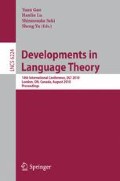Abstract
We define context-free grammars with Müller acceptance condition that generate languages of countable words. We establish several elementary properties of the class of Müller context-free languages including closure properties and others. We show that every Müller context-free grammar can be transformed into a normal form grammar in polynomial space without increasing the size of the grammar, and then we show that many decision problems can be solved in polynomial time for Müller context-free grammars in normal form. These problems include deciding whether the language generated by a normal form grammar contains only well-ordered, scattered, or dense words. In a further result we establish a limitedness property of Müller context-free grammars: If the language generated by a grammar contains only scattered words, then either there is an integer n such that each word of the language has Hausdorff rank at most n, or the language contains scattered words of arbitrarily large Hausdorff rank. We also show that it is decidable which of the two cases applies.
This research was supported by OTKA grant no. K75249 and the TÁMOP-4.2.2/08/1/2008-0008 program of the Hungarian National Development Agency.
Access this chapter
Tax calculation will be finalised at checkout
Purchases are for personal use only
Preview
Unable to display preview. Download preview PDF.
References
Bedon, N.: Finite automata and ordinals. Theor. Comp. Sci. 156, 119–144 (1996)
Bès, A., Carton, O.: A Kleene theorem for languages of words indexed by linear orderings. In: De Felice, C., Restivo, A. (eds.) DLT 2005. LNCS, vol. 3572, pp. 158–167. Springer, Heidelberg (2005)
Bloom, S.L., Ésik, Z.: Deciding whether the frontier of a regular tree is scattered. Fund. Inform. 55, 1–21 (2003)
Boasson, L.: Context-free sets of infinite words. In: Theoretical Computer Science (Fourth GI Conf., Aachen, 1979). LNCS, vol. 67, pp. 1–9. Springer, Heidelberg (1979)
Bruyère, V., Carton, O.: Automata on linear orderings. J. Comput. System Sci. 73, 1–24 (2007)
Bruyere, V., Carton, O., Sénizergues, G.: Tree Automata and Automata on Linear Orderings. ITA 43, 321–338 (2009)
Büchi, J.R.: The monadic second order theory of ω 1. In: Decidable theories, II. LNM, vol. 328, pp. 1–127. Springer, Heidelberg (1973)
Choueka, Y.: Finite automata, definable sets, and regular expressions over ω n-tapes. J. Comput. System Sci. 17(1), 81–97 (1978)
Cohen, R.S., Gold, A.Y.: Theory of ω-languages, parts one and two. Journal of Computer and System Science 15, 169–208 (1977)
Courcelle, B.: Frontiers of infinite trees. RAIRO Theor. Inf. 12, 319–337 (1978)
Ésik, Z., Iván, S.: Context-Free Languages of Countable Words. In: Leucker, M., Morgan, C. (eds.) Theoretical Aspects of Computing - ICTAC 2009. LNCS, vol. 5684, pp. 185–199. Springer, Heidelberg (2009)
Heilbrunner, S.: An algorithm for the solution of fixed-point equations for infinite words. RAIRO Theor. Inf. 14, 131–141 (1980)
Hunter, P., Dawar, A.: Complexity Bounds for Regular Games. In: Jedrzejowicz, J., Szepietowski, A. (eds.) MFCS 2005. LNCS, vol. 3618, pp. 495–506. Springer, Heidelberg (2005)
Montalbán, A.: On the equimorphism types of linear orderings. The Bulletin of Symbolic Logic 13(1), 71–99 (2007)
Nivat, M.: Sur les ensembles de mots infinis engendrés par une grammaire algébrique (French). RAIRO Inform. Théor. 12(3), 259–278 (1978)
Rosenstein, J.G.: Linear Orderings. Academic Press, London (1982)
Thomas, W.: Automata on Infinite Objects. In: Handbook of Theoretical Computer Science. Formal Models and Semantics, vol. B, pp. 133–192. Elsevier/MIT Press (1990)
Wojciechowski, J.: Classes of transfinite sequences accepted by finite automata. Fundamenta Informaticæ 7, 191–223 (1984)
Wojciechowski, J.: Finite automata on transfinite sequences and regular expressions. Fundamenta Informaticæ 8, 379–396 (1985)
Author information
Authors and Affiliations
Editor information
Editors and Affiliations
Rights and permissions
Copyright information
© 2010 Springer-Verlag Berlin Heidelberg
About this paper
Cite this paper
Ésik, Z., Iván, S. (2010). On Müller Context-Free Grammars. In: Gao, Y., Lu, H., Seki, S., Yu, S. (eds) Developments in Language Theory. DLT 2010. Lecture Notes in Computer Science, vol 6224. Springer, Berlin, Heidelberg. https://doi.org/10.1007/978-3-642-14455-4_17
Download citation
DOI: https://doi.org/10.1007/978-3-642-14455-4_17
Publisher Name: Springer, Berlin, Heidelberg
Print ISBN: 978-3-642-14454-7
Online ISBN: 978-3-642-14455-4
eBook Packages: Computer ScienceComputer Science (R0)

